Industrial Trades
Centralia College’s Industrial Trades certificate includes basic training needed for Diesel Technology, Electronics, Robotics, and Automation (ERA), Energy Technology, and Welding. It is a common first year of classes that ends with an Industrial Trades Certificate.



The common first year includes foundational classes, such as math, physics, and writing, and hands-on labs that offer basic welding, and electrical and mechanical systems. You will be introduced to all four industries and have more exposure to gears, fluids, and pumps than what was previously offered.
If you choose to continue studying to obtain your associate degree, you can decide which of the four trades to focus on during their second year. Centralia College is the only community and technical college that offers a common first year for four different industrial trades.
Career Possibilities in Industrial Trades
At the end of the first year, students with grades above a 2.0 will receive an Industrial Trades Certificate. The certificate confirms they have learned the skills and they may be hired to work as an entry-level mechanic assistant, robotics assistant, or millwright. If they choose to go to work after completing the first year, they may add additional Industrial Trades classes to increase their skills and abilities.
Upon successful completion, students will have demonstrated the ability to:
- Solve basic industrial math problems.
- Analyze and calculate data using spreadsheet software.
- Demonstrate the ability to apply acquired skills in the workplace.
- Perform repair procedures using proper tools while abiding by safety and environmental regulations.
- Identify, diagnose, and repair electrical and hydraulic circuits.
- Identify, diagnose, and repair industrial equipment.
- Identify, diagnose, and repair HVAC systems.
- Maintain proper workplace documentation in a professional manner.
- Conduct behavior that is consistent with the professionalism standards of the industry.
- Safely operate equipment and demonstrate practices that promote workplace safety.
- Work as a member of a team in an office or industrial setting and recognize the need to pursue results that exceed the minimum standards whenever possible.
- Embrace the inevitability of change in technology and pursue opportunities to improve skills with an attitude of “Lifelong Learning”.
- Diagnose, troubleshoot, maintain, and repair electrical components and systems.
- Design, implement and maintain automated systems including programmable logic controllers and industrial sensors.
- Diagnose, troubleshoot, and repair mechanical, hydraulic, and pneumatic components and systems.
- Independently analyze system errors and implement solutions.
Industrial Trades EDUCATION PLAN
Degree:Certificate of Proficiency
Emphasis: Industrial Trades
Total Credits: 48-55 credits
| First Year | |
| First Term |
|
| Second Term |
|
| Third Term |
|
| Notes |
|
ContactCareer & Technical EducationTech (TEC) Building, Room 114 360-623-8963 cte@centralia.edu |
John Steidel Faculty Office: TEC 202B 360-623-8622 Email John Steidel |
